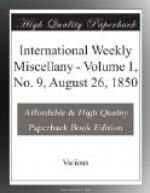Prentiss had originally a constitution of iron; his frame was so perfect in its organization, that, in spite of the most extraordinary negligence of health, his muscles had all the compactness, glossiness, and distinctiveness of one who had specially trained by diet and exercise. It was this constitution that enabled him to accomplish so much in so short a time. He could almost wholly discard sleep for weeks, with apparent impunity; he could eat or starve; do anything that would kill ordinary men, yet never feel a twinge of pain. I saw him once amidst a tremendous political excitement; he had been talking, arguing, dining, visiting, and traveling, without rest for three whole days. His companions would steal away at times for sleep, but Prentiss was like an ever-busy spirit, here, and there, and everywhere. The morning of the fourth day came, and he was to appear before an audience familiar with his fame, but one that had never heard him speak; an audience critical in the last degree, he desired to succeed, for more was depending than he had ever before had cause to stake upon such an occasion. Many felt a fear that he would be unprepared. I mingled in the expecting crowd: I saw ladies who had never honored the stump with their presence struggling for seats, counselors, statesmen, and professional men, the elite of a great city, were gathered together. An hour before I had seen Prentiss, still apparently ignorant of his engagement.
The time of trial came, and the remarkable man presented himself, the very picture of buoyant health, of unbroken rest. All this had been done by the unyielding resolve of his will—his triumph was complete; high-wrought expectations were more than realized, prejudice was demolished, professional jealousy silenced, and he descended from the rostrum, freely accorded his proper place among the orators and statesmen of the “Southern Metropolis.”
Mr. Clay visited the South in the fall of ’44, and, as he was then candidate for the Presidency, he attracted in New Orleans, if possible, more than usual notice. His hotel was the St. Charles; toward noon he reached that magnificent palace. The streets presented a vast ocean of heads, and every building commanding a view was literally covered with human beings. The great “Statesman of the West” presented himself to the multitude between the tall columns of the finest portico in the world. The scene was beyond description, and of vast interest.




